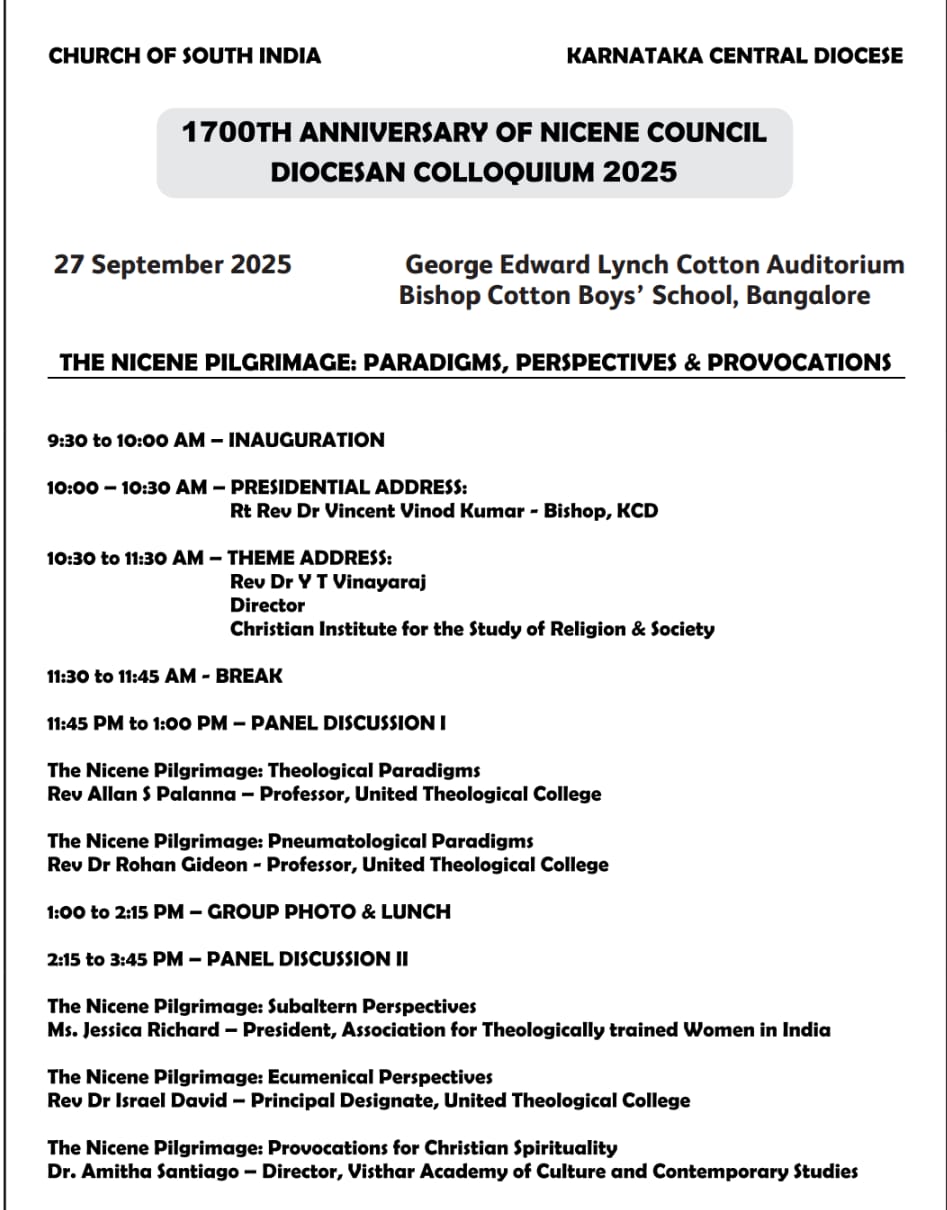Diocesan Colloquium - The Nicene Pilgrimage
Commemorating the 1700th Anniversary of the Council of Nicaea: A Colloquium
In celebration of the 1700th anniversary of the First Council of Nicaea (AD 325–2025), the Karnataka Central Diocese of the Church of South India hosted a Diocesan Colloquium titled “The Nicene Pilgrimage: Paradigms, Perspectives & Provocations” on 27 September 2025 at Bishop Cotton Boys’ School, Bangalore.
The colloquium brought together distinguished theologians, clergy, scholars, and laity from the churches to revisit the Nicene confession of faith — not as a relic of the past, but as a living testimony shaping the Church’s mission and witness in the 21st century. The event invited participants to rediscover how the Nicene Creed, which emerged as a unifying articulation of Christian belief in the early church, continues to speak powerfully to the contemporary world marked by fragmentation, pluralism, and shifting paradigms.
Inauguration and Presidential Address:
The inaugural session opened with words of welcome, prayer, and expressions of gratitude to God for the enduring witness of the Church through the centuries. The officers of the Diocese Rev Satish Timothy Paul, the Vice President, Rev Christopher Samuel, Secretary, Dr Solomon Raju, Treasurer, Rev Theodore William the Assistant Secretary and Mr Devdas Sadhu, Associate Treasurer graced the inaugural.
The Presidential Address was delivered by Rt. Rev. Dr. Vincent Vinod Kumar, Bishop of the Karnataka Central Diocese. In his address, the Bishop reflected on how the Nicene confession—“We believe in one God, the Father Almighty…”— continues to define the heart of Christian identity. He emphasized that the Council of Nicaea was not merely an event of doctrinal formulation but a pilgrimage of faith where the Church discerned truth amidst conflict and diversity. The Bishop reminded the assembly that the Nicene faith challenges the Church today to live out unity, justice, and holiness in an age of disunity and moral fragmentation.
Rev. Dr. Y. T. Vinayaraj, Director of the Christian Institute for the Study of Religion and Society in his keynote address he unpacked how the confession of Jesus as “true God from true God” continues to challenge imperial and consumerist images of Christ in contemporary society.
In his thought-provoking presentation, he invited participants to journey through the Nicene landscape as a pilgrimage of faith and freedom. He traced how the Nicene Creed emerged from the struggles of the early Christian community to define the mystery of Christ’s divinity and humanity. Moving beyond historical retrospection, he urged the Church to interpret the Nicene tradition as a living confession that speaks to contemporary realities of exclusion, ecological crisis, and systemic injustice.
His talk highlighted that the Nicene vision of God as Trinity calls the Church into relational life — one that resists domination and celebrates diversity. His address resonated deeply with participants, provoking reflection on how theology can become a force for transformation and reconciliation in the modern world.
“The Nicene Pilgrimage: Paradigms.”
Rev. Allan S. Palanna, Professor at United Theological College, presented “The Nicene Pilgrimage: Paradigms from a christological perspective ” He emphasized that Nicaea offers not only doctrinal clarity but also a theological framework for reimagining faith amidst new philosophical and scientific worldviews.
Rev. Dr. Rohan Gideon, Professor at United Theological College, spoke on “The Nicene Pilgrimage: Pneumatological Paradigms.” He emphasized the Spirit’s ongoing work in sustaining faith communities and guiding the Church toward creative engagement with the world.
The session culminated in a rich dialogue where participants discussed how Nicene theology could inspire fresh patterns of mission, discipleship, and public witness in India today.
Panel Discussion II – Perspectives and Provocations
The second panel discussion shifted the focus to the diverse perspectives and challenges that shape the Church’s contemporary pilgrimage of faith.
Ms. Jessica Richard, President of the Association for Theologically Trained Women in India, opened the session with “The Nicene Pilgrimage: Subaltern Perspectives.” She reminded the audience that the Nicene confession must be interpreted from the margins, where faith meets oppression, and where the Spirit empowers the voiceless to proclaim God’s liberating truth.
Rev. Dr. Israel David, Principal Designate of United Theological College, followed with “The Nicene Pilgrimage: Ecumenical Perspectives.” He highlighted how the Nicene Creed remains a cornerstone for Christian unity, calling churches beyond denominational divisions toward shared witness and sacramental fellowship.
Dr. Amitha Santiago, Director of Visthar Academy of Culture and Contemporary Studies, concluded with “The Nicene Pilgrimage: Provocations for Christian Spirituality.” She reflected on how the Creed shapes personal and communal spirituality—inviting believers to live with integrity, compassion, and ecological consciousness.
The panel illuminated how the Nicene faith is not static but dynamic, provoking the Church to embody theology in practice and to stand in solidarity with all who seek justice and truth.
The Diocesan Colloquium 2025 succeeded in rekindling the theological imagination of the Karnataka Central Diocese. It reaffirmed that the Nicene Creed, formulated seventeen centuries ago, continues to serve as a compass for Christian faith—guiding the Church toward unity, justice, and holiness.
Participants left the colloquium with a renewed conviction that theology is not confined to academic spaces but belongs in the heart of the Church’s mission. The Nicene faith is both heritage and horizon—rooted in history, yet calling believers to discern God’s future in today’s changing world.
Rev. J. Christopher Samuel
Diocesan Secretary








